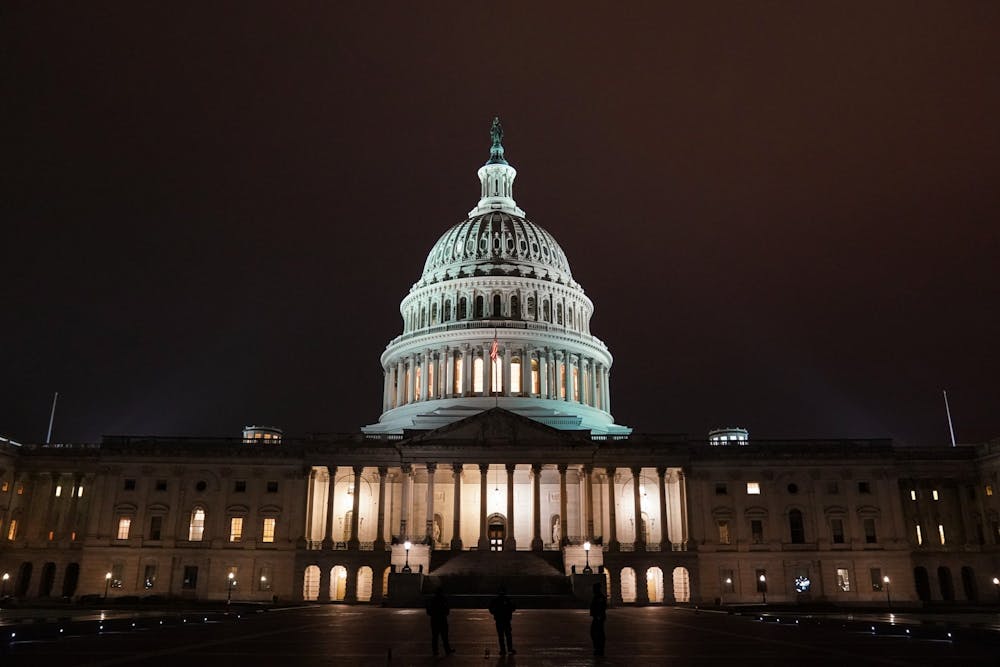A United States House of Representatives committee asked Penn for information about its endowment, citing alleged investments in "adversarial" entities.
On March 15, the U.S. House Committee on Ways and Means sent a letter to Penn President Liz Magill requesting information on three entities that Penn invests in which the committee has identified as "adversarial." The letter asks Penn to identify the three entities and answer whether there has been an increase in these investments since the creation of the Penn Biden Center.
The letter defined the entities as "adversarial" because they are listed on at least one of four U.S. government lists that denote entities that the United States regulates or prohibits from licensing or receiving domestic exports. These lists are the Entity List, the Military End User List, the Unverified List, and the FCC Covered List.
“Adversarial entities are contributing money to the university endowments as part of the Chinese Communist Party’s infiltration of our colleges and universities," Rep. Greg Murphy (R-N.C.) wrote in a press release. "We need to know if these funds are being used to gain influence over America’s current and future leaders."
In an emailed statement to The Daily Pennsylvanian, University spokesperson Ron Ozio refuted part of the letter's claims.
"Penn has no direct investments in the three entities referenced in the Ways and Means Committee letter, and rigorously complies with all regulatory and legal restrictions that apply to any foreign holdings," Ozio wrote.
Penn’s comment contrasts with what Murphy and Committee Chairman Jason Smith (R-Mo.) claim Penn wrote in its response to another letter previously sent on June 9, 2022, which was sent to 15 universities asking whether each university's endowment "had investments in adversarial entities" on the four U.S. government lists.
In its response to the June letter, Penn allegedly said that its endowment holds investments in three entities on the U.S. government's lists.
RELATED:
Penn alum Helen Gym talks mayoral campaign, Penn's role in Philadelphia at student event
Perry World House speakers discuss recent Brazil insurrection and right-wing populism
Murphy and Smith’s offices did not respond to multiple requests for comment, which included a request for a copy of Penn's June 2022 response.
Based on available public data, the March letter claimed that the percentage invested in listed entities is approximately $3.3 million out of Penn’s $20.7 billion total endowment holdings.
The most recent letter also claims that there is a relationship between recent revelations about the Penn Biden Center — including that the Center housed classified documents belonging to Joe Biden — and the committee’s review of University endowments and their investments.
“Public reports have also raised questions about foreign direct investment in the University of Pennsylvania and the relationship between those investments and the creation of the Penn Biden Center,” the letter went on to say.
The letter also alleged that the timing of the Penn Biden Center’s creation aligns with “members of President Biden’s family seeking business opportunities in China.”
Following the discovery of classified documents, the FBI searched President Joe Biden’s private office at the Penn Biden Center in mid-November. A University spokesperson denied allegations of foreign influence at the Center, writing that “the Penn Biden Center has never solicited or received any gifts from any Chinese or other foreign entity."
On Jan. 18, the House Oversight and Accountability Committee sent a letter to Magill alleging foreign influences at the Center. The letter inquired about foreign donations and visitors to the Center after the discovery of classified documents.
In a 2021 analysis, the DP found that foreign donations increased 389% from 2018 to 2019. In response, Penn attributed the increase to an international development campaign, the Power of Penn. The University received the largest sum of foreign donations from China at $77,457,323, followed by England at $57,410,522.
Regarding donations, Kyle Long, the senior director of Northwestern University's Office of Organizational Strategy and Change, said that the attention on foreign donations is mostly driven by conservative outlets. The letter is signed by two Republicans — Smith and Murphy.
"I do think that increased attention on foreign philanthropic contributions to American higher education is largely motivated by Republican and conservative talking points that are sort of hostile to American higher education in general," Long said.
Long added that there could be some concern about authoritarian regimes that want to exploit vulnerabilities in American society by interfering in higher education, but not necessarily through philanthropy.
"What I do see is that the sort of policy responses, or called-for policy responses, especially on the right, I do not think are appropriately calibrated to the threat," Long said. "It's a little bit blown out of proportion."









